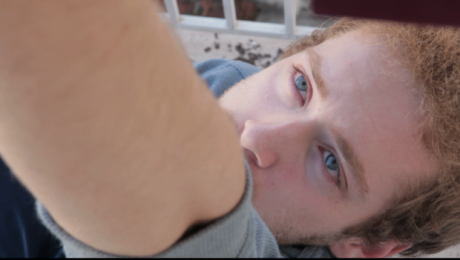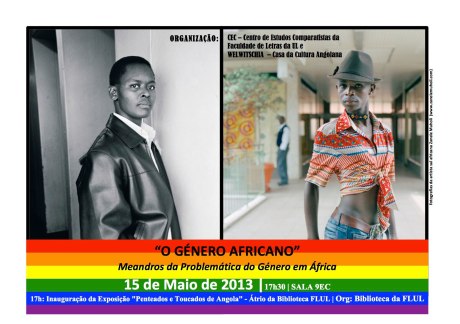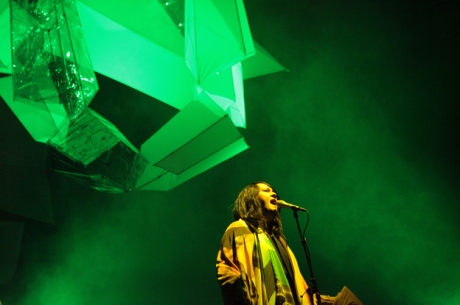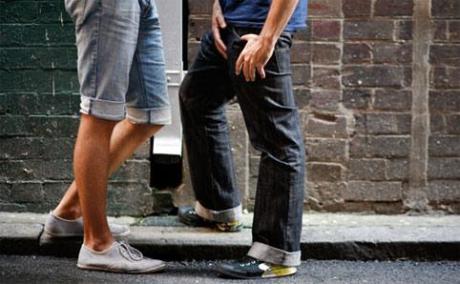espaços queer e cinema Julho 30, 2013
Posted by paulo jorge vieira in activismo, cidades, geografias das sexualidades, LGBT em portugal, lgbt no mundo, teoria e epistemologia da geografia.Tags: sexualidade
1 comment so far
A 17ª edição do festival Queer Lisboa terá a sua secção Queer Focus dedicada às questões relacionadas com cidade e sexualidade. Estarei por lá participando no debate. Aqui fica uma ideia do programa desta secção.
“Esta secção pretende oferecer um olhar à relação entre as diferentes realidades pessoais e comunitárias de indivíduos queer, com as políticas sociais e os efeitos da crise económica e da gentrificação que afectam o mundo nos dias de hoje.
Destaque neste programa para a estreia da longa-metragem grega Boy Eating the Bird’s Food(Grécia, 2012, 80’), um arrojado e comovente retrato do percurso de um jovem que perde tudo, na Atenas de hoje. Esta secção contará também com um debate que procurará abordar estas questões enquadradas na realidade portuguesa.
Programação completa da Secção Queer Focus:
The 727 Days without Karamo (Áustria, 2013, 80’), de Anja Salomonowitz
Boy Eating the Bird’s Food (Grécia, 2012, 80’), de Ektoras Lygizos
Gut Renovation (EUA, 2012, 82’), de Su Friedrich
Mondomanila (Filipinas, 2012, 75’), de Khavn
Wildness (EUA, 2012, 74’), de Wu Tsang
Stonewall 40 Years Later Junho 28, 2013
Posted by paulo jorge vieira in lgbt no mundo, sexualidades e géneros.Tags: Stonewall 40 Years Later
add a comment
O GÉNERO AFRICANO Meandros da Problemática do Género em África Maio 14, 2013
Posted by paulo jorge vieira in geografias das sexualidades, lgbt no mundo, queer theory.add a comment
O GÉNERO AFRICANO Meandros da Problemática do Género em África
15 de Maio: 17h30: SALA 9EC Faculdade de Letras da Universidade de Lisboa
17.00 horas: INAUGURAÇÃO DA EXPOSIÇÃO
Penteados e Toucados tradicionais de Angola
Artista: Helena Justino
Dir. Biblioteca FLUL: Prof. Doutor José Pedro Serra
Organização: Serviço de Difusão Cultural da Biblioteca FLUL
17.30 horas: SESSÃO DE ABERTURA:
Direcção do CEC
Direccão da WELWITSCHIA – Casa da Cultura Angolana)
Inocência Mata (FLUL-CEC/ Directora do Departamento de Línguas e Literatura da WELWITSCHIA – Casa da Cultura Angolana)
18.15horas: MESA REDONDA
Sessão 1: PARA ALÉM DO “CONHECIDO”
Moderadora: Inocência Mata (FLUL/CEC)
Afriqueer – algumas notas em torno da diversidade sexual
Paulo Jorge Vieira (CEG/IGOT-UL)
Identidades não normativas na literatura cabo-verdiana.
Mário César Lugarinho (USP, Brasil)
Pensar o Género a partir da Família: representações, ideais e vivências entre duas gerações de homens são-tomenses.
Sónia Ramalho (Dep. Antropologia/FCSH-UNL)
DEBATE | INTERVALO
Sessão 2: O GÉNERO E AS DINÂMICAS HISTÓRICAS
Moderadora: Manuela Ribeiro Sanches (FLUL/CEC)
A Lei Contra a Violência Doméstica em Angola (Lei nº 25/11, de 14 de Julho)
Afonso Malongui Malungo (jurista)
Ambiguidades de Género: masculinidades femininas no Campo Militar em Angola
Margarida Paredes (ISCTE-IUL)
Género e Violências na Guiné-Bissau: entre o público e o privado.
Joacine Katar Moreira (ISCTE-IUL)
ENCERRAMENTO
Direcção CEC/FLUL: Eduarda Ferronha (Vice-Presidente da WELWITSCHIA – Casa da Cultura Angolana)
radical gai (na voz de Ricardo Llamas) Maio 5, 2013
Posted by paulo jorge vieira in activismo, lgbt no mundo, queer theory, sexualidades e géneros.add a comment
(resolvi roubar este artigo de Juan Argelina retirado do seu blog, onde nos fala da Radical Gai – grupo activista surgido nos anos 90 – pela voz de Ricardo Llamas. Vale a pena ler e, também, escutar e ver os vídeos)
Me han venido a la cabeza muchos recuerdos al ver a mi antiguo compañero de la Radi, Ricardo Llamas, en estos videos; pero sin duda lo primero en venirme a la mente han sido imágenes de antiguas entrevistas realizadas por Paloma Chamorro para su memorable programa La Edad de Oro. No sé por qué. La estética. La forma de enfocar la escena. El tono. O más aún, la sensación de relato arqueológico. Al igual que ella dejaba que fluyera el verbo de Dalí o Miró, como iconos que eran de una vanguardia pasada, relatando lo que significaron en su tiempo, así Ricardo (sin pretender igualarlo a aquellos) expresa sus recuerdos de la Radical Gai como protagonista de una cierta vanguardia también de su propio tiempo. Un tiempo sin duda efímero, pero intenso, que marcó un deseo de transgresión hoy desaparecido. Como él dice, un deseo “hiperbólico”, que se marcaba discursos anacrónicos sobre la libertad sexual en un ambiente poco abierto a ampliar los límites de la política tradicional, incluso entre la izquierda. Ya se sabe que en cuestiones morales y de costumbres los cambios son más lentos. El discurso de la Radi era furibundo y sin concesiones. Usaba un lenguaje provocador, que removía el miedo conservador a superar los límites de la buena conciencia, del no hacer nada que llamase la atención sobre el tabú del sexo gay en todas sus manifestaciones, y sobre la realidad de ese mundo subterráneo y nocturno en el que se movía (y aún se mueve).
Aclara Ricardo nuestra propia contradicción, que llegó a acabar con la Radi, entre nuestras aspiraciones alternativas y nuestro deseo de gozar de la lúdica apertura que el mercado estaba abriendo a los gays a toda marcha, y que, como Paco Vidarte mostró en su Ética Marica, ha acabado convirtiendo al colectivo gay en la gran masa de consumidores clónicos, anodinos y apolíticos que es hoy día. En medio de esa transición, es cierto que la Radical Gai se veía claramente impotente. Sonreí imaginándonos con nuestras pancartas y pelucas plateadas en medio de las atronadoras carrozas del Gay pride con Alaska sonando a cinco mil decibelios. Cuando la reivindicación es sustituida por la macrodiscoteca y el consumo desaforado; y el marketing empresarial domina el comportamiento y las aspiraciones del personal, una asociación que no se integra en las nuevas reglas del mercado no tiene nada que hacer.
Hace ya casi 15 años que la Radi desapareció, y parece que ha transcurrido un siglo. ¿Somos más libres, más críticos, más solidarios, ya no vemos homofobia por las calles, todos queremos casarnos? Es revelador lo que leo en “Ética Marica“:
” La liberación de gays y lesbianas sólo ha sido posible y permitida pasando por el aro del capitalismo, del comercio, de la burguesía y sus valores discriminatorios: si hacéis profesión de fe de individualismo y milagro americano, os dejamos ser de los nuestros, pero sólo los que recen nuestro credo, los demás seguirán aplastados, aunque nunca diremos ya que lo son por maricas, por respeto a las maricas que están de nuestro lado. Simplemente cambiamos el discurso, pero las prácticas de exclusión y marginación permanecen idénticas y los sectores de la población que queríamos seguir manteniendo al margen y controlados lo siguen estando, pero hemos conseguido depurar la exclusión en provecho de la clase privilegiada, que tiene derecho a ser marica sin que ello le suponga un desclasamiento. Los pobres van a seguir siendo, sean maricas o no: que se las arreglen entre ellos si los marginados quieren seguir apredeando a mariquitas y travestis, asuntos sucios de gente baja que no nos preocupan. Nosotros somos ahora más fuertes, y nuestras instituciones también, como la familia, la herencia y transmisión del patrimonio, la ampliación de nuestra capacidad reproductiva (es más fácil ahora que adopte una marica rica que un matrimonio hetero pobre). Un hijo de gays ricos nunca será ya un “hijo del pueblo”, se lo hemos arrancado al pueblo y ya formará siempre parte de los nuestros.”
“La pedagogía de la liberación sexual ha sido jerárquica, de arriba abajo, y no ha tenido el más mínimo interés en llegar al campo, a las fábricas, a los ámbitos de trabajo y socialidad de las clases más bajas: no se combate, ni interesa, la homofobia en el pueblo, en los inmigrantes, en las cárceles, ¿quién se acuerda? Y si acaso, se utiliza como factor de discriminación y exclusión de los pobres, acusándolos de homófobos: acusamos a la cultura latina de subdesarrollada, de poco democrática, de homófoba; acusamos al islam, acusamos a las clases desfavorecidas económicamente de ser el verdadero reservorio de la misoginia, de la homofobia, del racismo, porque las clases altas y la burguesía ya han aprendido a no serlo y a ser libres sin oprimir a los demás. ¡Genial! Para que luego digan que la crítica de las ideologías ya no sirve para nada. Todo falsa conciencia, pues en el fondo se quieren mantener los privilegios de las clases acomodadas que han ampliado un poco su “nosotros”, ahora son más y más poderosos con las maricas integradas y disponen de nuevos instrumentos de opresión y de una nueva fachada de defensa de derechos sociales que les ha salido muy barata. Y nosotras a pintarles y enfoscarles su preciosa fachada.”
A esto me refería cuando hablaba del discurso provocador. Éste es el lenguaje que usaba la Radical Gai, por el que se nos consideraba “bichos raros”, al pinchar allí donde dolía. Un lenguaje de contenido político que, hoy por hoy, ha desaparecido, y que, in extremis, Paco Vidarte quiso vomitar antes de morir.
Towards Cosmopolitan Geographies of Migrations and Sexualities Março 18, 2013
Posted by paulo jorge vieira in geografias, geografias das sexualidades, lgbt no mundo.Tags: andrew gorman, geographies of sexualities, population geography, queer migration
add a comment
(call for paper to proposed session to the II European Geographies of Sexualities Conference, Lisbon, 5 a 7 September)
Convened by: Paulo Jorge Vieira (Center for Geographical Studies, Institute of Geography and Spatial Planning, University of Lisbon); Andrew Gorman Murray (University of Western Sydney); and Jorge Macaísta Malheiros (Center for Geographical Studies, Institute of Geography and Spatial Planning, University of Lisbon)
This session will discuss the inter-relations between the “geographies of sexualities” and the field of population geography, including research on both international and intranational migration. In this sense, this session will map out possible themes that cross different fields of the (inter)disciplinary correlate of gender, sexuality and migration.
Recognizing a multiplicity of research conducted in recent years, this session will discuss the importance of migration and of different forms of mobility in the construction of the subjectivities of non-heteronormative sexualities and a variety of gender expressions and roles (Binnie, 2004). This includes issues akin to what Kath Weston (1995) called the “great gay migration”, discussions of “queer diaspora”, and the application for political asylum based on sexual orientation (Fortier, 2001 and 2002).
Empirical and/or theoretical papers (in English, Portuguese or Castilian) are welcomed on any theme that deepens the plural understanding of the geographic dimensions of mobility, internal and international migration, including:
- Genders, Sexualities, Mobilities and Migrations;
- Sex Work and International Migration;
- LGBT and queer international migration;
- Queer mobility inside of national territories;
- Post-Colonialism, Sexualities and Migration;
- Cosmopolitanism, urban space, sexual and national minorities;
- Asylum seekers, sexual orientation, gender expression and public policies
Deadline for submission is 18th April 2013. Please send a 300 words abstract to Paulo Jorge Vieira (pjovieira@gmail.com) and Andrew Gorman-Murray(a.gorman-murray@uws.edu.au)
For more details about the conference, please visit the website: http://egsc2013.pt.to/
‘Future Feminism’ by Antony’s Janeiro 23, 2013
Posted by paulo jorge vieira in activismo, lgbt no mundo.Tags: antony and the johnsons, antony hegarty, feminism
add a comment
No álbum ao vivo “Cut the World” (2012) de Antony and the Johnsons, gravado com a Orquestra de Câmara Nacional da Dinamarca, Antony Hegarty apresenta um belíssimo monólogo intitulado ‘Future Feminism’ – apresentado pela primeira vez em Copenhaga em Setembro de 2011 – problematizando a contemporaneidade e o papel dos feminismos hoje. Apesar de não estar de sempre acordo com este, que é um dos meus cantores preferidos, aconselho a sua leitura atenta.
“I’ve been thinking all day about the moon. Like, is it an accident that women menstruate once a month and that the moon comes once a month? Are other animals synchronized in this way with the moon? You know, my brother works in mental health and he says that there’s a lot more hospitalizations and periods of activity during the full moon. It’s a known fact in mental health that people are more excitable around the full moon.
“And then, what about the fact that we’re made of 70% water? And then the whole ocean reacts to the full moon, right? In a serious way. Everything’s ticking around that moon and if we’re 70% water I must be having some — at least homeopathic — relationship with the changing cycles of the moon.
“I can’t escape my obsession with the idea that I’m made out of this place, because I was raised to believe that I fundamentally was constituted of spiritual matter that was from somewhere else like Heaven or from a Sky God. Like Gore Vidal talks about Sky Gods and I really picked up that language because in patriarchal monotheisms we all worship a God elsewhere who has a plan for us in a paradise elsewhere: After we die there will be a paradise waiting for us and this place is like a work station where we sort of get all our ‘T’s crossed and our ‘I’s dotted before we go off to a real spiritual dimension.
“But I’m a witch. I actually de-baptised myself. And what’s great about being transgender is you’re born with a natural religion. It applies almost across the board no matter what culture or economic group or nation that you’re from — you’re almost automatically a witch. None of the patriarchal monotheisms will have you. It’s very clear that in most of those religions you’d be put to death. In many parts of the world you still are put to death.
“Did you hear what the Pope said a couple years ago on Christmas? He said that the marriage of gays and lesbians was as much a threat to the future of our world as the collapse of the rain forests. [audience laughter] So, that gives you a sense — just an inkling to his approach to the homosexual question. [laughs] And that’s just the homosexual question. He didn’t even address the transgender question. [sarcastically] God knows what we’ve caused. All sorts of wars and strife — all manner of hurt.
“I’m worried that the ecology of the world is collapsing and that I won’t have anywhere to be reborn because I actually believe, like, where is any of us going? Where have any of us ever gone? We’ve come back here in some form. Did you know that whales were once land roaming mammals? And then they crawled back into the ocean trying to find something to eat? And then eventually they got rid of their hands and legs.
“I’ve been searching and searching for that little bit of my constitution that isn’t of this place and I still haven’t found it. Every atom of me, every element of me seems to resonate, seems to reflect the great world around me. So, I’ve come to the conclusion that this is God’s best idea — that this manifest world is the frontier of his dream, or her dream in my opinion. So, that’s just my point of view from where I can start to establish a new way to value the world that I’m a part of. Cause if I’m not heading off to paradise elsewhere when I die then I have more of a vested interest in observing a sustainable relationship with this place.
“It’s a very indigenous idea that the Earth is a female, that the Earth menstruates, that the water of the world is the blood of a woman’s body and that’s what we crawled out of just in the same way that we crawled out of our mother’s wombs. It’s the most basic idea; any child could come up with it and it’s so obvious. And yet we’ve been straining for these Sky Gods for a couple thousand years now. And I remember praying to God when I was like six years old. I was raised Catholic and I prayed really hard, and I waited and waited to hear that summons. I think in a funny way, a lot of my music I’m listening for that response still.
“I’ve heard two rumors about the Dalai Lama. One is that he said he wasn’t going to be reincarnating because the world was going to be too dangerous and that’s probably just a rumor. But then I heard a far more interesting new rumor, which is that the Dalai Lama said the next time he incarnates it will be as a girl, which will be the first in the history of Buddhism. But I think that that is the most revolutionary thing he could possibly do and the most helpful spiritual gesture that he could make. And I’m very interested in the feminization of the deities. I’m very interested in Jesus as a girl. I’m extremely interested in Allah as a woman. And contrary to popular opinion, it’s not bad to say that — you can say it. I mean you might get a little letter in the mail but I’m probably due a hundred letters in the mail already, so… [laughs]. It’s a wonderful day to die.
“But nonetheless, Allah as a woman is a critical threshold and Buddha as a mother is another one because I truly believe that unless we move into feminine systems of governance we don’t have a chance on this planet [applause]. And there’s no one else that can lead the masses to do that except for, like, the major religious institutions. And I’m someone who’s looking for a reason to hope, and for me hope looks like feminine systems of governance being instated in, like, the major religious institutions and throughout corporate and civil life. And it might sound far-fetched, but if you look at your own beliefs, just imagine how quickly you accepted the idea that the ocean is rising and the ecology of our world is collapsing. We can actually imagine that more readily than we can imagine a switch from patriarchal to matriarchal systems of governance — a subtle shift in the way our society works.
“It’s obviously a very broad statement — and of course Sarah Palin exists so don’t bother me with that. But, Sarah Palin is working very much within patriarchal systems. I just love that moment when Benazir Bhutto was being interviewed and she just talked about motherhood and daughters and how she wished she’d had done more for the girls of her country. For as problematic as she was, she was an exciting forerunner.”
The importance of public sex in an age of digital appliances Janeiro 2, 2013
Posted by paulo jorge vieira in geografias das sexualidades, lgbt no mundo, queer theory, sexualidades e géneros.Tags: contact sex, sexual minorities
add a comment
The importance of public sex in an age of digital appliances
Gordon Brent Ingram
“Not so long ago, sex was a way to make friends and even to find détente with enemies, to take a furtive communion in the midst of hostility, and to get the lay of the land naked in some obscure location that could barely be argued to be “in public.” Once upon a time, there was a neo-tribal kind of linear progression: a simple arc starting with desire, then investigation, the creation of a map, eventual contact, sex (singular or countless), pleasure, a bit of satisfaction, inevitable exhaustion, and then dispersal. A few marriages resulted but they were incidental. And for a few moments, the city, the town, and even the forest were transformed, especially for sexual minorities, from battlefields to playgrounds.
But this formula was always a bit naïve like those early 20th-century books written by anthropologists who went into remote villages, had sex with a few eager young people, and then went on to attain academic stardom on the strength of their self-delusions. Throbbing phalluses were never quite the antennae reconnecting planetary forces (though I swear it felt that way). And rather than temples to nature, the “open” spaces in which we found refuge were more often trashed and neglected rather than ecosystems comparably rich as our desires and capabilities. In these modern times of social media, public sex is just as important as it was before Craigslist and Facebook. In many parts of the world, aside from those urban parks of yesteryear that too often today have video surveillance, there is more, not less public sex. After many legal battles, with many losses and some victories, much more of the world’s cities harbor some zones where public sex can be had with minimal risk of violence and arrest. However, social media is inverting and diffusing the flows in these new forms of neural nets such that actual sex is more often the foreplay and the money shot is that nanosecond of initial digital contact and fantasy.
Today our lives are littered with cheap, electronic appliances that do not make up for bisphenol A (BPA), declining sperm counts, lack of exercise, overwork and stress, and cancers. Public space and public sex are being regulated through poorly functioning appliances. The gorilla glass will eventually shatter. The viruses cause grief and the batteries will eventually poison drinking water. Does it feel any better to maneuver through a toxic waste dump rather than an “enchanted” forest? Not really. But occasionally we still have fun, make friends, learn something new, and push a little harder on the cages that so constrain who we are, what we can be, and who and how we enjoy and sometimes love.”
(in “Petite Mort: Contents Recollections of a Queer Public”, Published by Forever & Today, Inc. New York, pp.150, 2011)
são francisco e o mito… Janeiro 27, 2012
Posted by paulo jorge vieira in lgbt no mundo, mestrado geografia.Tags: global tourism, neighborhood communities, queer san francisco, sophisticated city, utopian visions
add a comment
São Francisco é um mito. A cidade é um presença contínua nos estudos sobre cidades e sexualidades queer. Desde Castells que a cidade é uma permanência continua nessa investigação. No entanto Nan Alamilla Boyd tem vindo a desenvolver uma interessante investigação na área da história social sobre século XX por aquelas paragens (ver entre outros o livro ‘Wide Open Town: A History of Queer San Francisco to 1965’). Por isso aqui fica uma pequena citação demonstrativa do seu olhar crítico:
“Capitalizing on the utopian visions of San Francisco’s distinctly ethnic and sexually liberated neighborhood communities, entrepreneurs disrupted and altered the plans of San Francisco’s cultural elites for a profitable and culturally sophisticated city—the jewel of the American West and a key player in the burgeoning Pacific Rim economy. If the elite idyll of a successful San Francisco depended on social and racial hierarchies that tamed and subdued the assertion of new political identities and entitlements (and, through state action, controlled market forces), entrepreneurs, entertainers, and consumers created an alternative vision that foregrounded the possibilities of new racial and sexual constellations that promised social and economic fluidity and mobility. Through market forces (via local and global tourism), the performative reiteration of new identities (via public entertainments), and the formation of new identity-based communities out of a loosely configured cohort of voyeuristic consumers, new racial and sexual subjectivities came on the scene, eventually competing with elites for political entitlements and economic justice”.
(Nan Alamilla Boyd, “The Making of San Francisco’s Queer Urban Scene”, pp. 245-246)
Yo me veo relajadísima, mucho más que los otros… Julho 25, 2010
Posted by paulo jorge vieira in Citações, lgbt no mundo.add a comment

Polémica como sempre a filósofa do estado espanhool, Beatriz Preciado dá-nos uma aula de provocação nesta entrevista. Leituras diversas sobre a crítica queer ao sexo, género e a homo/heterossexualidade como constructos sociais…
Usa conceptos como ‘biohombre’, ‘biomujer’, ‘biopolítica’; la biología está en su obra.
Sí, me interesa la vida, pero en su dimensión somática, carnal, corporal.
También habla de arquitectura, de la ciudad como organismo.
Quizá el origen de todo sea el cuerpo, pero no como organismo natural, sino como artificio, como arquitectura, como construcción social y política. Eso que siempre imaginamos como biológico -la división entre hombre y mujer, masculino y femenino- y que es una construcción social. Me interesa la dimensión técnica de eso que parece natural.
Hablamos de género en Occidente en 2010. Pero pensemos en un niño que nace en Malí, ¿su sexo y su género también es artificio biopolítico?
Claro, fíjate en las distinciones que estableces. Para indicar naturaleza, piensas en África, como si aquí estuviera la tecnología y el artificio, y en África, la naturaleza. Estas distinciones funcionan para lo masculino y lo femenino. Lo masculino como técnica, construcción, cultura. Lo femenino como naturaleza, reproducción. Lo que es construido es esa distinción naturaleza/cultura que no existe, que es ficticia.
¿Los cromosomas XX y XY no significan nada?
Son un modelo teórico que aparece en el siglo XX para intentar entender una estructura biológica, punto.
Sostiene que la sexualidad es plástica. Que no es una constante en la vida, ni siquiera en el día. ¿Esa es la esencia de su teoría?
En parte sí, en el sentido de que la sexualidad, que es de forma más amplia la subjetividad, y en la que entra la identidad y la orientación sexual, los modos de desear, los modos de obtener placer, son plásticos. Y precisamente por eso están sometidos a regulación política. Si fueran naturales y determinados de una vez por todas, no la habría.
Por regulación se refiere a que se determine que se es hombre o mujer en el DNI, y a ello correspondan X derechos, X deberes, X roles.
Exacto. Hay un enorme trabajo social para modular, controlar, fijar esa plasticidad. Y no sólo política, también psicológicamente. Cada individuo es una instancia de vigilancia suprema sobre su propia plasticidad sexual. Cuando preguntabas de dónde viene mi rebelión, es de ahí. Cómo es posible que no estemos en revuelta constante, que esto no sea la revolución.
(também publicado em 5 dias)
¿STONEWALL EN EL SALVADOR? Abril 4, 2010
Posted by paulo jorge vieira in lgbt no mundo.Tags: América Latina, LGBT, Stonewall
add a comment
Este jueves 25 de marzo, un nutrido grupo de agentes del CAM (Cuerpo de Agentes Metropolitanos) y de la PNC (Policía Nacional Civil) irrumpieron en una gran mayoría de locales LGBT y con la excusa de pedir papeles irrespetaron procedimientos, integridades físicas y psicológicas tanto de propietarios como de clientes de los negocios.
Son hechos lamentables que hay que denunciar. Existe un proceder sistemático para atemorizar a la clientela y propietarios de negocios LGBT por parte de la alcaldía municipal de San Salvador que recuerda la represión en EEUU para la época de Stonewall. Motivo más para unirnos más y denunciar con fuerza estos atropellos institucionales contra nuestra comunidad.
mais info aqui
(também publicado no 5 dias)







